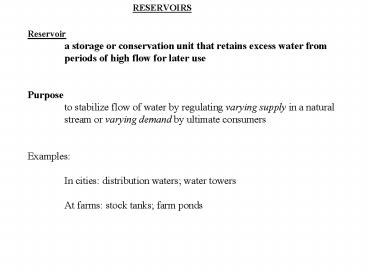RESERVOIRS - PowerPoint PPT Presentation
1 / 7
Title:
RESERVOIRS
Description:
b. Normal Pool Level : max. elevation to which the reservoir surface will rise during ordinary ... B = constants that relate to the compaction characteristics ... – PowerPoint PPT presentation
Number of Views:40
Avg rating:3.0/5.0
Title: RESERVOIRS
1
RESERVOIRS
Reservoir a storage or conservation unit that
retains excess water from periods of high flow
for later use Purpose to stabilize flow of
water by regulating varying supply in a natural
stream or varying demand by ultimate
consumers Examples In cities distribution
waters water towers At farms stock tanks
farm ponds
2
RESERVOIRS
Physical Characteristics of Reservoir a. Storage
Capacity (most important) volume of storage
for primary purposes b. Normal Pool Level
max. elevation to which the reservoir surface
will rise during ordinary operation
procedures c. Minimum Pool Level lowest
elevation to which the pool is to be drawn under
normal conditions Useful storage volume b/t
minimum and normal pool levels Dead storage
volume below minimum pool level Surcharge
storage uncontrolled only occurs during flood
and cannot be retained for later
use Valley storage a natural stream channel
in reservoirs (indention in construc.)
3
RESERVOIRS
Physical Characteristics of Reservoir d.
Yield amount of water that can be supplied from
the reservoir during a specified interval of
time (dependent on inflow varies from year to
year) Safe (Firm) Yield max. quantity of
water that can be guaranteed during a critical
dry period (lowest natural flow
period) - Not known w/certainity calc. in
Probabilistic terms. Secondary Yield
water available in excess safe yields during
periods of high flow e. Reservoir
Reliability the probability that the reservoir
will deliver the expected demand throughout its
lifetime w/o incurring a deficiency Reservoir
Reliability Curve Storage vs. Probability (or
Reliability) 100 Reliability is impossible
4
RESERVOIRS
5
RESERVOIRS
6
RESERVOIRS
Specific Weight of Deposited Sediment
W specific wt. (dry) of sediment deposit
(lb/ft3 , kg/m3) T age of deposit (years) B
constants that relate to the compaction
characteristics of the soils Subscripts 1, 2, 3
for sand (1), silt (2), and clay (3), respectively
7
RESERVOIRS
Reservoir Capacity Eventually all reservoirs
are filled with sediment Sediment inflow large
compared with reservoir capacity Short life
reservoir Sediment inflow small compared with
reservoir capacity Long life reservoir Trap
Efficiency (TE) amount of inflowing sediment
that is retained reservoir capacity / total
inflow TE decreases with increasing time b/c
reservoir capacity is reduced by sediment
accumulation over time.































